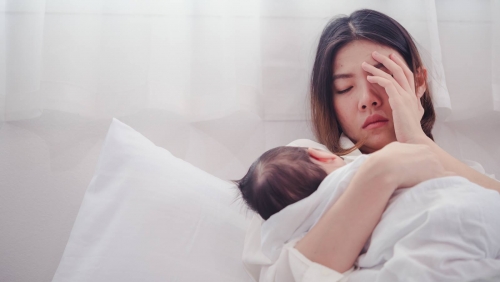New mothers in Bahrain feel powerless, discouraged due to post-partum body shaming
TDT | Manama
The Daily Tribune – www.newsofbahrain.com
Reported by Julia Cassano
Accepting the new postpartum body can be a huge struggle for new mothers, especially amid the tantrums of fluctuations in hormones, sleep, energy, appetite and concerns over stretch marks. Add social media to that equation, and it is common to feel uncomfortable and awkward.
New mothers in Bahrain, as well as researchers, say the before and after social media images of mothers who have shed their baby weight soon after pregnancy, meant to inspire, are often doing the opposite.
Mothers here say that such posts, dubbed “fitspiration” by netizens, besides draining their confidence, had also smashed their self-esteem.
The worst is that these negative attitudes seldom die, with many developing poor attitudes about eating, while getting discouraged about their body.
Proper guidance is the key
Alaa Al Shaikh, a certified master trainer by the European Institute of Fitness, confirms this to The Daily Tribune and recommends new mothers proper and healthy guidance on using social media during prenatal and post-partum stages.
“Social media, most definitely, impacts pregnant women and new mums by forcing them to look a certain way. Also, it affects their physical and mental well-being, including body image dissatisfaction,” confirms Alaa Al Shaikh.
It is therefore crucial for new mothers to build “confidence and raise self-esteem” to feel proud and comfortable in their new bodies and curves. Alaa confirms to The Daily Tribune that she raises awareness on this topic during sessions and urges them to understand that not everything they see on social media is real.
“Additionally, I do not allow any negative body image discussions or body shaming during my sessions,” Alaa said.
Survey confirms the worst fears
The Mental Health Foundation, in a survey released recently, said that over four in 10 who had been pregnant (66% of the women surveyed) said they felt ’more negative’ about their bodies afterwards, compared to just over one in 10 (12%) whom themselves felt ’more positive’. According to Alaa, the surplus of highly edited pictures online is worsening the issue.
“I have seen many women comparing their bodies to those Instagram images, and unfortunately, they tend to place judgement on themselves. I felt pressure after giving birth Danielle, a mother of one, confirms this nightmarish scenario as she shared with The Daily Tribune her experience.
“During my pregnancy, I felt great; however, it was after giving birth that I started to feel pressure. “When I notice celebrities posting their post-partum pics immediately after giving birth, I compared mine to theirs and put pressure on myself to look a certain way.
“Social media definitely did not help me post-pregnancy.” Alaa told Tribune that she aims to change this by teaching them healthy ways to work out during pregnancy. “Working out during pregnancy can provide many benefits under proper guidance.
“This will ensure that you are less likely to gain extra unneeded weight, get back to your average weight faster after delivery, experience more energy and are less likely to suffer back problems.
“This will improve your mood, while the delivery can be more manageable at the pushing stage, and you will lower your diabetes risk and have a healthy baby.”
Workout 20 to 30 minutes
Alaa urges pregnant women to work out a minimum of 20 to 30 minutes of moderate-intensity exercise on most, if not all days, in the absence of medical or obstetric complications.
“If you are new to exercise, ensure you have the proper guidelines or a certified trainer when exercising to keep both you and the baby safe. “But most of all, I urge pregnant women and new mums to enjoy the process, love their strong bodies, and admire the new changes and curves that help grow your healthy baby.”
Related Posts


